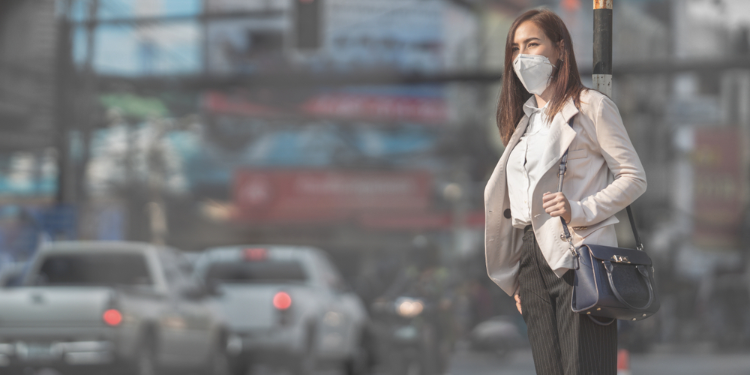The toxic gases, smog, and fine particles responsible for the pollution are not only attributed to industries but also to agricultural activities in the region and neighboring countries. But what are the consequences of this escalation on daily life and economic activity? Can you have a normal expat life in a city with high levels of air pollution?
The situation in Thailand
Many expatriates are compelled to settle in countries where air quality is below the levels recommended by the WHO. On a daily basis, this poses a challenge for the professional and personal lives of residents, especially those having health issues. Thailand has recently been criticized for its high pollution levels, particularly in the city of Chiang Mai in the north of the country, which is well known for being the home of many long-term foreign residents.
The main culprits are suspended particles (Particulate Matter, PM), particularly the PM2.5 particles, which are the finest and most toxic. These particles mainly come from the burning of agricultural lands practiced by farmers from February to May, at the end of the rice, sugarcane, and corn seasons. Additionally, industrial activities and pollution from vehicle emissions exacerbate the levels of fine particles to nearly 180 micrograms of PM2.5 per cubic meter, which is 34 times the safety levels recommended by the WHO.
The poor air quality in Thailand has led to increased hospitalizations and chronic illnesses such as bronchitis, asthma, emphysema, and other conditions resulting in reduced overall lung function. Since the beginning of 2023, in Chiang Mai and Bangkok, nearly 2.5 million people have sought treatment for respiratory problems, and just last April, there were no less than 185,000 hospitalizations in a week.
The impact of pollution on tourism
According to Tanit Choomsang, Vice President of the Chiang Mai Tourism Council, the number of tourists has dropped by 20%, and since the beginning of the year, the sector has seen a decrease in new bookings from travelers. Moreover, some retired foreigners have reportedly shortened their long stays to avoid the "smog season."
A survey conducted by the British honorary consul in Chiang Mai during the Covid pandemic questioned members of the international community about the poor air quality. Out of approximately 1,500 expats from 45 countries, more than half (52%) responded that they were seriously considering leaving Chiang Mai, especially due to air quality issues during the dry season and the impact on the local and regional economy. This figure reached 65% for expats in the 15 to 45 age group.
Other highly polluted countries in the world
According to IQAir, many Asian countries are in the top ten air pollution list. In fact, 46 out of the 50 most polluted cities in the world are located in Asia, followed by the Middle East and Africa. The three leading causes of air pollution are, in order, industry with its factories, refineries, and mines; agriculture and the heavy use of fertilizers in farming; and transportation with fuel combustion in motor vehicles.
The latest World Air Quality Report (2022) provides an overview of historical data from 2018 to 2022, measuring the evolution of PM2.5 air quality in 323 cities across 131 countries, regions, and territories. According to the report, among the most polluted countries in the world, based on annual averages of PM2.5 particle concentration, are Chad, Pakistan, Bangladesh, India, Egypt, the United Arab Emirates, Qatar, China, and Indonesia. These countries exceed the limits set by the World Health Organization by 5 to over 10 times.
On the other hand, countries with good air quality include Iceland, Australia, New Zealand, and Finland, with fine particle levels within WHO standards, ranging from 3.4 to 5 micrograms per cubic meter. According to the 2022 IQAir report, poor air quality is responsible for over six million deaths each year. Exposure to air pollution causes and exacerbates problems such as asthma, cancer, lung diseases, heart diseases, and premature mortality. Moreover, air pollution affects vulnerable populations more severely, with over 90% of pollution-related deaths occurring in low- and middle-income countries. According to the WHO, only 10% of the world's population currently lives in an environment with good air quality.
Moving to a polluted country or city: how to adapt?
Air pollution is a significant challenge for countries worldwide, although some have shown goodwill in reducing PM2.5 concentrations to acceptable levels. However, these countries only represent 10% of those mentioned in the IQAir report.
If you are moving to one of the most polluted countries or cities in the world, it is useful to implement strategies and adopt good habits to protect yourself and your family from the impact of fine particles on your health.
Firstly, you are advised to research the air quality of the country you are moving to, including variations that may occur during dry and wet seasons, as in some Asian countries. Each country dealing with high air pollution levels will have defined rules that are best to follow during peak fine particle concentrations: avoiding going out at certain times, refraining from outdoor sports, etc. For this, refer to the local authorities in your new place of residence.
Several websites provide historical and real-time data, allowing you to stay updated on the subject. Additionally, numerous applications can monitor the air quality you breathe, such as IQAir Air Visual, Plume Labs, AirNow, or AirCare.
Air quality sensors are also available for purchase to measure indoor air quality and monitor its changes. Other models can be installed outside, close to your home, to monitor fluctuations in air pollution. These sensors are connected to an application that you can download on your smartphone or tablet.
Another good way to protect yourself from air pollution is to install an air purification/filtration system in your home. While it involves a significant cost, it will allow you to purify the outdoor air entering the house when the air quality is acceptable and ventilate the indoor spaces. Conversely, according to the IQAir report, when outdoor air quality reaches unhealthy levels, it is advisable to adjust air conditioning systems to recirculation mode and close doors and windows to prevent polluted air from entering indoors.
Finally, whenever you go out, remember to wear high-quality protective masks. Their effectiveness depends primarily on three factors: the pollution filter, tightness, and the presence of a ventilation valve. The recommended models to protect against pollution are N95 and N99, which are equivalent to FFP2 and FFP3 masks in Europe, respectively.
















